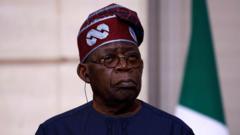The upcoming elections mark a significant transition in Mexico's judiciary, moving from appointments to popular votes.
Judicial Elections in Mexico: A Historic Shift Towards Democracy

Judicial Elections in Mexico: A Historic Shift Towards Democracy
Mexico prepares for its groundbreaking judicial elections, allowing citizens to vote for judges and magistrates nationwide.
Mexican voters are gearing up for a transformative election this Sunday, making history as they will have the unprecedented opportunity to elect more than 2,600 judges and magistrates. This election includes positions on the Supreme Court and various other federal, state, and local tribunals. This shift from an appointment-based judiciary to one determined by voter choice aims to enhance democracy by reducing nepotism and corruption.
Proponents of this judicial overhaul, initiated by the ruling Morena party and driven by President Andrés Manuel López Obrador and his successor Claudia Sheinbaum, argue it restores democratic power to the people. They believe this change will counteract a history of problematic appointments and unchecked influence within the judicial system.
However, this ground-breaking move is not without controversy. Critics highlight that the system might empower the incumbent government even further, posing a risk of inexperienced or unqualified candidates being elected, possibly increasing the vulnerability of the judicial process to criminal organizations, including drug cartels.
As Mexicans prepare to cast their votes, challenges arise regarding the structure and potential implications of such a significant restructuring of the judiciary. This election is set to be a defining moment for Mexico's democracy, urging voters to consider how they want their justice system to operate.
The main focus points for this election include understanding why citizens are voting for judges, the process behind it, and the impact this decision will have on the country's governance.
Proponents of this judicial overhaul, initiated by the ruling Morena party and driven by President Andrés Manuel López Obrador and his successor Claudia Sheinbaum, argue it restores democratic power to the people. They believe this change will counteract a history of problematic appointments and unchecked influence within the judicial system.
However, this ground-breaking move is not without controversy. Critics highlight that the system might empower the incumbent government even further, posing a risk of inexperienced or unqualified candidates being elected, possibly increasing the vulnerability of the judicial process to criminal organizations, including drug cartels.
As Mexicans prepare to cast their votes, challenges arise regarding the structure and potential implications of such a significant restructuring of the judiciary. This election is set to be a defining moment for Mexico's democracy, urging voters to consider how they want their justice system to operate.
The main focus points for this election include understanding why citizens are voting for judges, the process behind it, and the impact this decision will have on the country's governance.


















